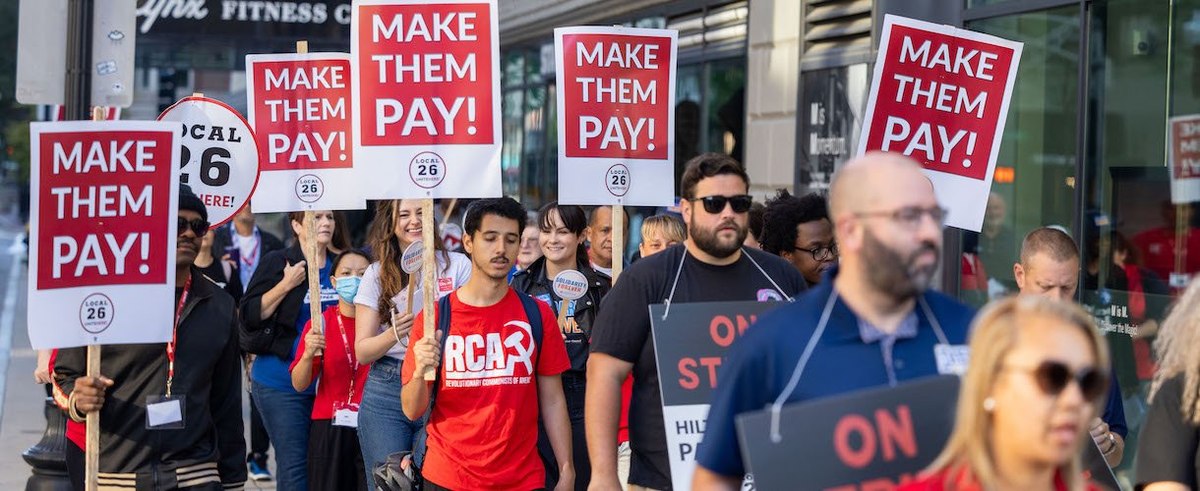Labor unions are popular among Americans — especially for occupations such as firefighters, nurses, and construction workers, a new survey finds. Even the most unpopular form of union in the poll — a union of university instructors — is viewed more favorably than unfavorably. While some believe that unions result in more frequent strikes and higher consumer costs, larger shares say that they have positive effects, including increasing worker salaries and giving workers more power and job satisfaction.
15% of Americans are either a union member or share a household with someone who is. 37% personally know someone — including themselves, a family member, friend, or acquaintance — who has gone on strike.
There is division over how the strength of unions has changed over time, as well as over expectations for the future. Slightly more Americans believe that over the past year, unions have grown stronger (26%) than think they have grown weaker (17%); 31% think unions' strength hasn't changed much. By 33% to 13%, Americans expect unions will become more rather than less influential going forward; 23% think their influence won't change. These results are similar to findings of surveys conducted around this time of year in each of the past two years.
Types of unions
Americans are more than twice as likely to have favorable views of labor unions overall (59%) as they are to have unfavorable opinions of them (26%).
Attitudes towards unions within 20 specific occupations vary, with between 49% and 71% of Americans holding positive opinions of each of them. The unions viewed most favorably are those for firefighters (71% of Americans view them very or somewhat favorably), nurses (68%), and construction workers (67%). The largest shares have unfavorable opinions of unions for university instructors (30%), actors (30%), and government employees (30%).
Democrats are far more likely than Republicans to have a favorable view of labor unions in general (81% vs. 44%), and a similar pattern holds for most of the 20 specific types of unions asked about. The largest partisan gaps are in opinions of unions for journalists, actors, and screenwriters — all of which Democrats have more favorable views of than Republicans do.
The one exception to Democrats viewing unions more favorably is police unions, which are the most popular type of union among Republicans — tied with firefighters — and the least popular among Democrats. Police unions also proved divisive on another recent YouGov survey, which found that they were among only a few of the 20 entities and roles within the criminal justice system to be regarded more highly by Republicans than by Democrats.
Effects of unions
At least half of Americans believe that labor unions increase workers' wages (67%), job security (63%), negotiation power (63%), and job satisfaction (51%). Around half say unions increase the frequency of strikes (48%) or the cost of goods and services (47%).
There is division over how, if at all, unions affect the number of jobs, company profits, and the flexibility of companies to adapt to market changes. More say unions decrease (42%) than increase (21%) the ease of hiring and firing workers.
Democrats are more likely than Republicans to believe that labor unions increase workers' wages, negotiation power, job security, job satisfaction, and productivity. More Republicans than Democrats think that labor unions increase the frequency of strikes, as well as the cost of goods and services.
Related:
- Americans are sympathetic to labor unions in recent strikes
- Biden is more likely than Trump to be seen as siding with striking auto workers over manufacturers
- More Americans side with union workers than with management in recent strikes
- Most Americans support strikes by Hollywood writers and actors
- Do Americans think labor unions are making a comeback?
- Most Americans agree that unions get better wages and working conditions for workers
- Who do Americans think has more leverage: workers or employers?
— Carl Bialik contributed to this article
See the results for this YouGov poll
Methodology: This poll was conducted online on August 22 - 24, 2024 among 1,130 U.S. adult citizens. Respondents were selected from YouGov’s opt-in panel to be representative of adult U.S. citizens. The sample was weighted according to gender, age, race, education, 2020 election turnout and presidential vote, baseline party identification, and current voter registration status. Demographic weighting targets come from the 2019 American Community Survey. Baseline party identification is the respondent’s most recent answer given prior to November 1, 2022, and is weighted to the estimated distribution at that time (33% Democratic, 31% Republican). The margin of error for the overall sample is approximately 4%.
Image: Getty











